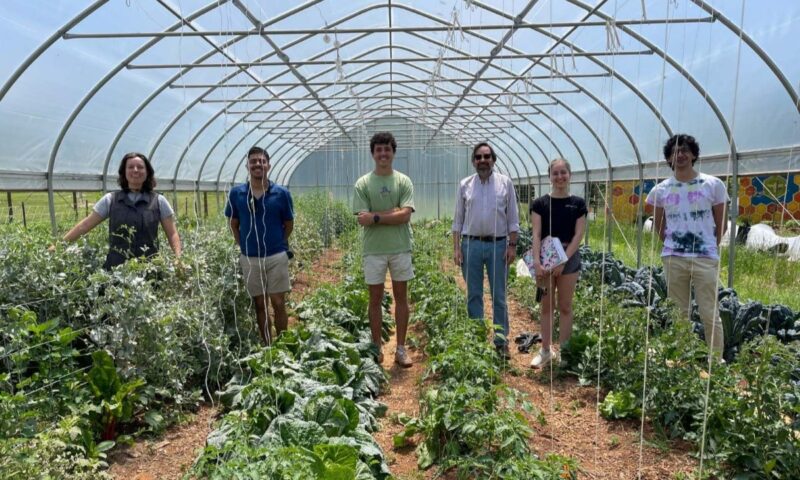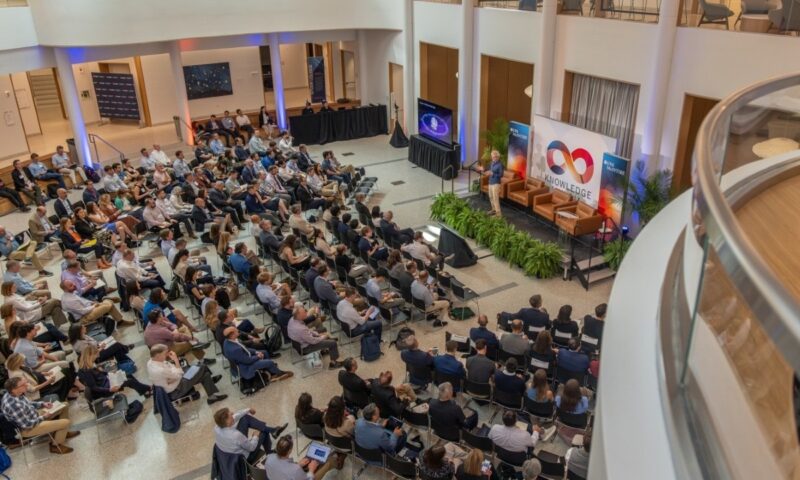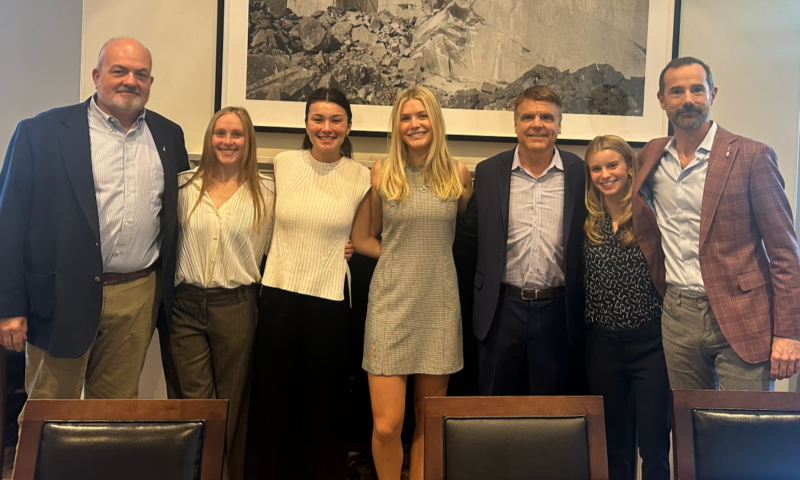David Csordas is the first. He’s the inaugural student to come through UVA’s combined Ph.D. in Biomedical Engineering program from the School of Engineering and the M.S. in Commerce with a Biotechnology Track from the McIntire School of Commerce. Csordas is charting new territory through this innovative, dual-degree academic venture that fuses biomedical and business acumen and aims to equip students like him with the skills needed to navigate and potentially revolutionize the often difficult road connecting science and industry.
Building a Strong Scientific Foundation
Before arriving on Grounds, the Newtown, CT, native laid a solid foundation in science groundwork at the University of Connecticut, where he majored in Physiology and Neurobiology, with a double major in Pathobiology. During his undergraduate years, he honed his research skills through internships with Boehringer Ingelheim, a pharmaceutical giant. These experiences solidified his passion for scientific inquiry and innovation, ultimately leading to a full-time research position after he graduated in 2019. Csordas reflects on his time at Boehringer Ingelheim as both enriching and a catalyst for future aspirations: “I liked the hands-on research, but I knew I wanted to kind of go higher. I wanted to be more than technical—also running scientific projects. I was interested in formulating ideas.”
His decision to return to academia was driven by a desire to not only advance in the scientific world but also to equip himself with the ability necessary to lead complex projects and translate scientific ideas into practical applications.
This ambition found its perfect match at UVA and with the dual-degree program.
Charting a New Course at UVA
Upon arriving at UVA, Csordas found an ideal academic and research environment to meet his interdisciplinary goals. Biomedical Engineering’s Ph.D. program, housed in both the School of Engineering and the School of Medicine, attracted him with its bio-focused and computational approaches. His interest was sparked by his previous work at UConn and driven by an industry that increasingly values data and computational analysis to better understand complex biological systems.
The UVA faculty and staff played a crucial role in his decision, particularly Shayn Peirce-Cottler, Harrison Distinguished Teaching Professor and Chair of the Department of Biomedical Engineering, an adviser who provided academic support and a welcoming environment. Csordas notes, “Right off the bat, she was super supportive, and her mentorship philosophy drove me to want to work for her.” That support, combined with UVA’s strong emphasis on practical and computational aspects of biomedical engineering, piece together a curriculum that is as challenging as it is rewarding.
Csordas’s role as the first duel-degree student in the M.S. in Commerce Biotechnology Track reflects a significant step for both him and UVA. The Biotechnology Track within the McIntire School of Commerce was introduced during his second year of the Ph.D., with the aim to merge commerce with his scientific pursuits. It was through courses like Frontiers of Biotechnology, led by McIntire Professor Nikki Hastings, that Csordas witnessed firsthand the potential of turning scientific ideas into viable business propositions.
The curriculum, in his words, “really brings in experts from the industry and drills into the nitty-gritty to answer questions like ‘How do I make this scientific idea into a product? How do I approach regulation? How do I approach getting funding?’”
The M.S. in Commerce’s focus on bridging science and commerce offered Csordas a comprehensive platform to understand the regulatory, financial, and strategic facets of biotechnology. The knowledge he is acquiring will prove pivotal for Csordas when he re-enters the complex professional realm of bringing scientific innovations to market.
Collaborative Learning and Diverse Perspectives
At McIntire, Csordas has thrived in a collaborative environment where cross-disciplinary insights are fueling his educational experience. Engaging with peers from diverse academic backgrounds has also enriched his understanding of business challenges and strategies. For example, while some of his classmates excelled in finance, Csordas brought his expertise in data systems and biotechnology analytics to the table, offering a unique perspective that enhanced group projects and class discussions.
While Csordas says he sees value in all of his coursework and that it’s difficult to single out a class, he notes that Organizational Behavior with Professor Emma Zhao has imparted valuable lessons that extend beyond conventional business education. He explains the universal applicability of learning to manage people in corporate and academic settings. “Even disregarding the business component—like as a Ph.D. in the pharmaceutical industry, I’m sure at some point I’ll be managing people—before this class, no one taught us how to manage. If I wanted to stay in academia, you still need to know how to manage people, but how to do that is never explained, so I’ve really gained a lot about how to do that from Organizational Behavior.”
He also credits Professor Ira Harris and his Strategy course for opening his mind and changing how he sees himself as a consumer, as he now finds himself regularly thinking about topics such as positioning among brand competitors when he’s shopping.
“Having worked in pharma for two years and having the science background, the lens I take to these classes is applying the subject to the pharmaceutical industry or biotech,” Csordas says, noting how Strategy offered essential insights to the nature of the biotech startup industry, as many such ventures have a goal of becoming acquired. The time spent on Strategy helped to him to better understand the answers to central questions: “How do they make their product marketable and attractive? How do they make their company as attractive to larger companies as possible?” he explains.
His experience with all McIntire faculty has been overwhelmingly positive. Csordas calls them passionate teachers who encourage rich discussions in the classroom, and outside of class are extremely responsive, showing how much they care by being thoroughly invested in their students doing well.
Community and Future Vision
Outside the classroom—both on and off Grounds—Csordas has embraced his precious free time in Charlottesville, finding a balanced lifestyle conducive to advanced study. The city’s cultural offerings, coupled with its natural beauty, provide an ideal backdrop for Csordas as he navigates the demands of his dual-degree program. He speaks highly of Charlottesville, describing it as “a great town to be a grad student in,” sharing his penchant for attending downtown events, shopping at farmers markets, playing adult league soccer, and hiking in nearby Shenandoah.
 While undertaking the dual-degree Ph.D./M.S. in Commerce Program has had challenges, Csordas candidly discusses the difficulty of adapting to business-specific content such as finance and accounting. However, he views these challenges as opportunities for growth that complement his scientific expertise. Ultimately, Csordas’s experience at UVA synthesizes commerce and biomedical engineering to equip future leaders like him with the skills to innovate and make significant strides in bridging science and business.
While undertaking the dual-degree Ph.D./M.S. in Commerce Program has had challenges, Csordas candidly discusses the difficulty of adapting to business-specific content such as finance and accounting. However, he views these challenges as opportunities for growth that complement his scientific expertise. Ultimately, Csordas’s experience at UVA synthesizes commerce and biomedical engineering to equip future leaders like him with the skills to innovate and make significant strides in bridging science and business.
Looking forward, Csordas envisions a multifaceted career path that leverages the full spectrum of his dual-degree experiences. Whether translating academic research into marketable products or contributing to biotechnology incubators, his aim is to remain at the forefront of scientific innovation and commercialization. “I want to do translational research. I want to be as close to the clinic as possible. And any opportunity I have to interact with patients drives me,” he asserts, emphasizing his commitment to translational research that impacts patient care.
McIntire recognizes the generosity of the Coulter Foundation, which has supported Csordas’s opportunity at the School.



